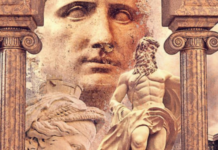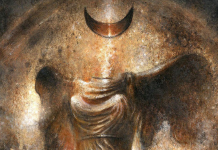 During my thesis year of college, I was completely and utterly stuck. After three years in art school, working within the bounds of assignments, all I wanted was to let loose and create what I wanted. But I had no idea what that was; I kept reaching into my idea-place and pulling out nothing. This thesis needed to be perfect, a representation of myself as a person and an artist, so I had to figure out what made me tick, and fast. The thing is, I had some repressed, unresolved trauma. And when you put someone like that in a room by themselves for a month and tell them to think about themselves, interesting things happen.
During my thesis year of college, I was completely and utterly stuck. After three years in art school, working within the bounds of assignments, all I wanted was to let loose and create what I wanted. But I had no idea what that was; I kept reaching into my idea-place and pulling out nothing. This thesis needed to be perfect, a representation of myself as a person and an artist, so I had to figure out what made me tick, and fast. The thing is, I had some repressed, unresolved trauma. And when you put someone like that in a room by themselves for a month and tell them to think about themselves, interesting things happen.
Little flashes came to me — thoughts, memories, emotions — but nothing I could use, because I couldn’t explain what I was thinking or why I felt the way I did. At that point I just needed a thesis topic, and during a desperate search for ideas I suddenly felt a presence near me, followed by the sensation of hands resting gently on my shoulders. I felt a message then, in the back of my mind. “Spring is here. It’s time to leave.” Over the next few days, I was bombarded with pomegranate imagery. I took it as a sign.
I went forward with the idea of creating art based on the Persephone story, and read every version I could get my hands on. (Yes, even the Harlequin young adult version. Yes, I still feel dirty.) That didn’t pan out and I ended up doing something else, but the research was very enlightening. A lot of modern writers have tried to create an “empowered” Persephone by either making the abduction consensual or casting Demeter as a smothering, overbearing mother. While there is some mythological precedent for both of those, I find that neither speaks to me. They don’t ring true, or feel right in my gut, or however you like to put it. I read a version where Hades didn’t exist at all. Persephone simply turned to her mother one day and said she was going to rule the Underworld for a time, because it was something she needed to do. Or perhaps, like Evey’s imprisonment in V for Vendetta, Persephone’s abduction by Hades was merely a plot device to set the stage for her growth. That was a little better, but still not quite right.
No, I’m sure Persephone didn’t choose the Underworld. She was a child, as was I, and rare is the child who would willingly go into the dark with a stranger. But that doesn’t mean our eyes can’t adjust, or that we can’t learn from what we see there. To me, it almost seems as though Hades forgot the true nature of his realm. To him, it was a vault, a prison, where he kept the souls of the dead the same way he kept the gems and precious metals in the ground. He meant to keep Persephone there as well, but he failed to take into account the cyclical, transformative nature of the Underworld. What goes down must come up. What rots below the earth in the winter feeds the coming spring’s flowers. And those who descend into the Underworld, willingly or otherwise, often learn more than their keepers bargained for.
It’s very easy for me to imagine Hades as an unsympathetic and almost pathetic character, an acquisitive manchild who never considered the consequences of his actions. Perhaps I’m projecting my own experiences onto him, or maybe not giving him enough credit. After all, he didn’t create the Underworld, and isn’t its original ruler.
Many versions of the story don’t even mention Hekate, but I’ve always felt her role as Persephone’s guide in the Underworld is one of the most important aspects of the story. For the first time in her life, Persephone is without her mother. And even if she were there, Demeter wouldn’t be much help; she belongs to the world above, with the sun and the fields, and knows nothing of the darkness her daughter must face. (Maybe that’s why I never connected with Demeter the way I have with Persephone and Hekate, having been underground so long myself.) Hekate, on the other hand, knows it well, probably even better than Hades. Hekate is much older than him, being a titan (the ancient Greek equivalent of an old god, as the Lovecraft aficionado in me can’t help but notice). And unlike Hades, who seems to want Persephone more as a possession than a companion, Hekate has some interest in her well-being. Whether out of compassion, or for more obscure reasons, Hekate taught Persephone the nature of the Underworld, how to survive there, and most importantly, what she could do with that knowledge.
Which brings me to the most important aspect of the story: those pomegranate seeds, and why Persephone swallowed them. Conventional wisdom holds that it was a trick, that Persephone would never have chosen to claim the Underworld on her own volition, but I think she knew exactly what she was doing. She wasn’t deceived, and she didn’t resign herself to her fate. In fact, she did the opposite.
I see a lot of parallels here with Eve and the Tree of Knowledge, but with some crucial differences. Eve was in paradise. She had never known darkness or suffering before eating the fruit, and did so (it seems to me) out of sheer curiosity.
Persephone was already traumatized. She was abducted, taken away from her mother and imprisoned in a strange place, and had no idea when or if she’d see the sun again. And even if she’d been rescued, what then? She’d still have the memories of what happened, and her life couldn’t continue as it had before. In my mind, eating the seeds is symbolic of acceptance, not of Hades or what he did, but of her situation. She knew she had to change, to transform in response to her experience, or else she’d be miserable whether she was above or below ground. And by accepting her status as Queen of the Underworld, she gained some measure of power there, and was no longer helpless against Hades. (And with Hekate there to teach her how to wield it, he probably had a very bad few months!) She accepted that darkness and ugliness as part of herself, even though she never wanted it in the first place, and learned to use that rot to grow her beloved flowers.
Though going there wasn’t my choice, I can never abandon the Underworld entirely, or the gifts it gave me. The darkness gave me a place to hide until I was ready to understand where I was and why. I have encountered more than one Hades, seeking to lock me up in the dark, and more than one Hekate, offering guidance and a torch. And that presence is still there, pushing me forward. Whether it’s Persephone herself, or some other being communicating through that metaphor, or a manifestation of my own subconscious, I really can’t say. (And honestly, I don’t see much distinction between them, but that’s another discussion.)
The Underworld can be a confusing and deceptive place. I hadn’t even realized I was there until I was compelled to leave. To go back to V for Vendetta, I was in a cage for a long time before I was shown the bars. And once I saw them, and realized how in the dark I was, I knew I could never have perfect light again. But I could find a place for myself moving between to two.
Image credit: jacqueline








